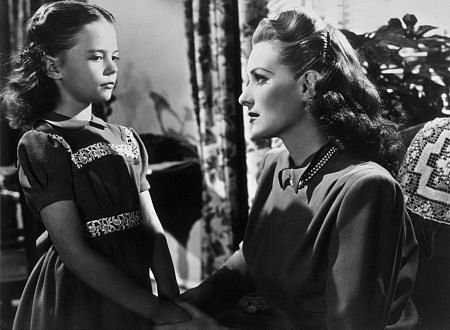 It's one of those classic movies you can't escape, yet hardly notice since it's so familiar, but the 1947 movie has a few striking things about it if you stop to look. One good and one bad.
It's one of those classic movies you can't escape, yet hardly notice since it's so familiar, but the 1947 movie has a few striking things about it if you stop to look. One good and one bad.On the good side, Maureen O'Hara's character is a picture-perfect example of a positive portrayal of a woman in a time when even the attempts to depict women as the equals of men are uniformly tinged with patronizing undertones or trying too hard. No one in the movie ever treats her in the slightest bit differently than they do any of the male businessmen, neither positively nor negatively. No one expects her to get coffee, looks down on her for working while raising a child, or expects that her work will be in any way less than that of her colleagues. No one feels a need to accomodate her femaleness in any way. She's precisely this: a competent, hard-working business professional who happens to be female. Even positive depictions of female business professionals done in movies twenty or thirty years later are still tinged with inequities, patronizing tones, or overcompensation (and of course such things still exist in both the movies and real life).
However, as much as that's a positive, the movie ultimately irks me because of the bad light in which it casts rationality. The entire conflict of the film is predicated on the main character's false dichotomy that rationality and imagination are mutually opposed, but nothing could be farther from the truth. That false dichotomy is used throughout the movie to cast rationality as a bad life choice, one which deprives you of the joys of life and makes you miss what's truly important, through the rhetorical trick of claiming it is opposed to imagination, then showing how much joy comes from imagination.
I know, it's "just a movie," and a fantasy one at that which no one really expects should be taken literally. But the attitude is insidious and it's what the entire movie is built around, it's the central lesson, the moral, the very premise. Rationality is something to be triumphed over from the very first scene. You can't give them credit for reinforcing a cultural principle in their subtext in one place without giving them blame for reinforcing a damaging one everywhere else.
The fact is that rationality embraces imagination, and nothing about being rational even intimates that one should never engage in imagination or fantasy. Kris Kringle would certainly never be caught dead encouraging Susan to actually believe she is a monkey; he's only telling her it can be an important part of a full life to be able to imagine and pretend she is. Implicit in that is that Susan must also know which is pretend and which isn't. Rationality embraces imagination both for its own virtues (the ones Kringle exhorts) and for its utility as a tool of rationality, but never repudiates it -- it only repudiates the same thing Kringle would if pressed (but carefully never has to say out loud in the movie), the inability to tell it from truth.
How much better a lesson Kringle could really have taught Susan if she'd been shown that those who engage their imaginations can be very well balanced, rational, sensible people who get all the joy Kringle speaks of, and all the virtues her mother speaks of, at the same time, and not only aren't those opposed, they're aligned. Doris Walker is merely a straw-man of rationalism set up for Kringle to knock down. Too bad. They weren't far from a really uplifting conclusion, instead of an ultimately self-destructive one.

 RealTime and RTC
RealTime and RTC Prism
Prism Uncreated
Uncreated Bloodweavers
Bloodweavers Foulspawner's Legacy
Foulspawner's Legacy Lusternia
Lusternia
No comments:
Post a Comment